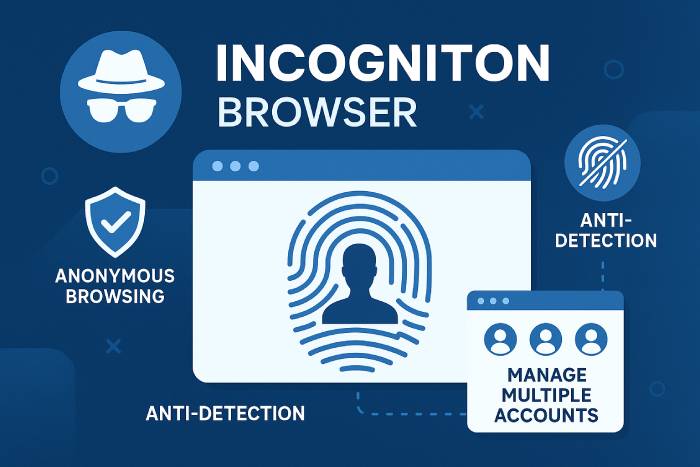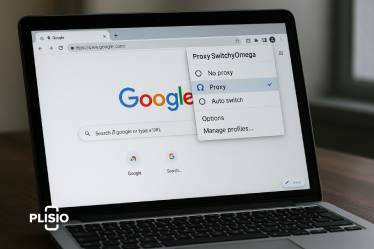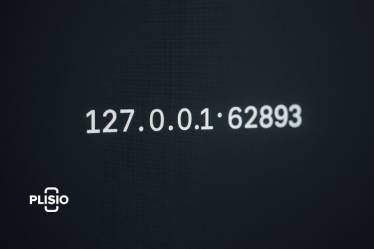Browsing Without Traces: Incogniton Browser Review

Safeguarding online privacy is becoming increasingly difficult as websites and major tech companies develop more sophisticated tracking methods. Standard browsers like Chrome or Edge are not designed for anonymity — they are built by companies that gather user data through browsing activity and IP address.
The Incogniton browser offers a different approach. Built as an anti-detect browser (also referred to as an antidetect browser), Incogniton provides privacy-focused tools specifically for digital marketers, affiliate professionals, and social media managers who need to manage multiple browser profiles without being tracked.
With a growing number of anti-detection browser options available, this review will help you determine if Incogniton offers the features you need — or if other solutions like Multilogin may be a better fit.
What Is Incogniton Antidetect Browser?
Incogniton is an advanced browser developed to enhance anonymity and simulate multiple browser environments. Unlike Chrome’s basic Incognito mode or tools like Icogni, which remove your personal data from databases, Incogniton is an anti-detect browser that helps manage multiple accounts with minimal risk of detection.
This browser allows users to create multiple browser profiles, each configured with unique digital fingerprints. A browser fingerprint — made up of screen resolution, operating system, IP address, and plugins — helps websites identify users. By customizing and masking these details, Incogniton ensures your online activities are separated and harder to track.
Traditional tools like VPNs, Incognito modes, or standalone proxies are no longer enough to ensure true anonymity. Anti-detection browsers like Incogniton provide more effective privacy protection by isolating online sessions.
Designed with marketers and social media managers in mind, Incogniton is particularly helpful for those who need to manage multiple social media accounts or perform high-volume marketing activities.

What Is Incogniton Used For?
The Incogniton browser is mainly used in marketing, e-commerce, and privacy-focused fields. Key use cases include:
Affiliate Marketing
Marketers often manage multiple advertising accounts across different platforms. Using a traditional browser puts those accounts at risk of being flagged. Incogniton allows affiliates to simulate separate user environments and avoid detection — ensuring campaigns stay active.
Social Media Management
Platforms like Facebook and Instagram are strict about duplicate accounts using the same IP or fingerprint. Social media managers use Incogniton with residential proxies to create and maintain multiple social media accounts for their clients or campaigns.
E-commerce and Dropshipping
Business owners who need to manage multiple seller or buyer accounts across platforms use Incogniton to handle logins securely. The ability to create multiple browser profiles with different IP addresses helps avoid platform bans.
Market and Price Monitoring
For businesses tracking competitors' prices, the Incogniton browser allows anonymous browsing and automation of price comparisons — especially when combined with rotating proxies.
Key Features of the Incogniton Anti-Detect Browser
Incogniton offers powerful functionality tailored to anti-detection needs:
Fingerprint Customization
Each browser profile can be configured with a unique fingerprint. You can adjust screen resolution, time zone, operating system, and plugin settings to avoid detection. These tools allow users to simulate real-world browsing environments with precision.
Proxy Integration
Incogniton supports a wide range of proxies, including SOCKS4, SOCKS5, and HTTPS. Users can group, rotate, or import and export proxies easily to improve anonymity and avoid bans across services.
Team Management
If you work with a team, Incogniton allows you to assign profiles and set permissions for each team member. This is ideal for agencies that manage multiple client accounts or campaigns.
Bulk Profile and Account Creation
With its user-friendly interface, Incogniton supports the creation of hundreds of browser profiles in bulk. This is especially helpful for those who need to manage multiple accounts efficiently and with minimal setup.
Automation with Selenium
The Incogniton browser allows automation of logins and online tasks through Selenium integration (Python currently, Java support coming soon). Developers can write scripts to simulate repetitive tasks, increasing speed and efficiency.
Synchronizer (Beta)
A unique feature still in beta, Synchronizer lets you copy actions across multiple profiles simultaneously. You can visit URLs, adjust windows, or run tests in parallel — saving time for users who manage multiple browser environments.
Support and Accessibility
Incogniton provides responsive customer support via Telegram. Most issues are resolved within minutes, which is a major benefit for professionals depending on uptime.
Getting Started: Tips for New Users
Here are a few tips for anyone new to Incogniton:
- Start with the free plan to explore its user-friendly interface and features.
- Use residential proxies instead of datacenter ones for better anonymity.
- Experiment with fingerprint settings like screen resolution and time zone until your profile passes detection tests.
- Learn how to import and export browser profiles for faster setup across devices.
Anonymity and Data Protection
Incogniton takes online privacy seriously. Browser profiles are encrypted and securely stored. Communication between your device and Incogniton’s servers is protected, and the company states that it does not log your online activities — providing confidence for privacy-conscious users.
Use Case Examples
Affiliate Marketer Success
John used Incogniton to manage multiple ad accounts across networks without raising red flags. His revenue tripled within months after switching to this anti-detection browser.
Dropshipping Workflow
Sarah, a full-time e-commerce seller, relied on Incogniton to separate supplier and customer accounts. The browser allowed her to automate login sessions and manage multiple accounts with ease.
Social Media Campaigns
A digital agency used Incogniton’s fingerprinting and proxy features to run campaigns across dozens of social media profiles, increasing engagement by over 40%.
Comparison: Incogniton vs Other Anti-Detection Browsers
Here’s how Incogniton compares with other popular anti-detect browser options:
| Brand | Operating System | Starting Price/Month | Free Trial | Trustpilot Score |
|---|---|---|---|---|
| Incogniton | Windows, macOS, Linux | $29.99 | Yes | 3.7 |
| Multilogin | Windows, macOS, Linux | $99 | Yes | 4.5 |
| AdsPower | Windows, macOS | $5.40 | Yes | 4.8 |
| GoLogin | Windows, macOS, Linux | $24 | Yes | 4.1 |
| Ghost Browser | Windows, macOS | $21 | Yes | 3.2 |
Incogniton Pricing Plans
Incogniton offers scalable options:
| Plan | Price/Month | Profiles | Team Members |
|---|---|---|---|
| Entrepreneur | $29.99 | Up to 50 | None |
| Professional | $79.99 | Up to 150 | 3 |
| Multination | $149.99 | Up to 500 | 10 |
All plans allow access to API, Selenium automation, proxy management, and more. Whether you're a solo marketer or an agency, Incogniton offers pricing that fits.
Choosing the Right Proxy for Incogniton
- Residential Proxies: These are highly recommended when using Incogniton for account management or advertising. They closely mimic real users, making them less likely to trigger bans.
- Datacenter Proxies: Cost-effective and fast, but easier to detect. Best suited for tasks like anonymous browsing or data scraping.
Final Thoughts
The Incogniton browser stands out as a feature-rich anti-detection browser, built for those who need to manage multiple accounts across various platforms. With support for fingerprint customization, proxy integration, automation, and team collaboration, Incogniton provides a solid balance of power and usability.
If you need to manage multiple browser profiles, protect your online privacy, and streamline your digital operations, use Incogniton — a reliable tool for modern anonymous browsing.




